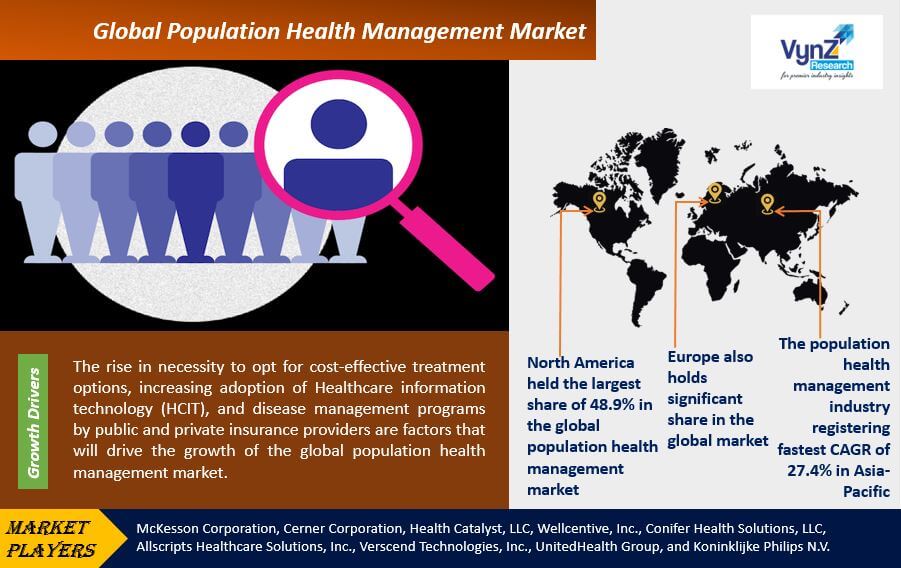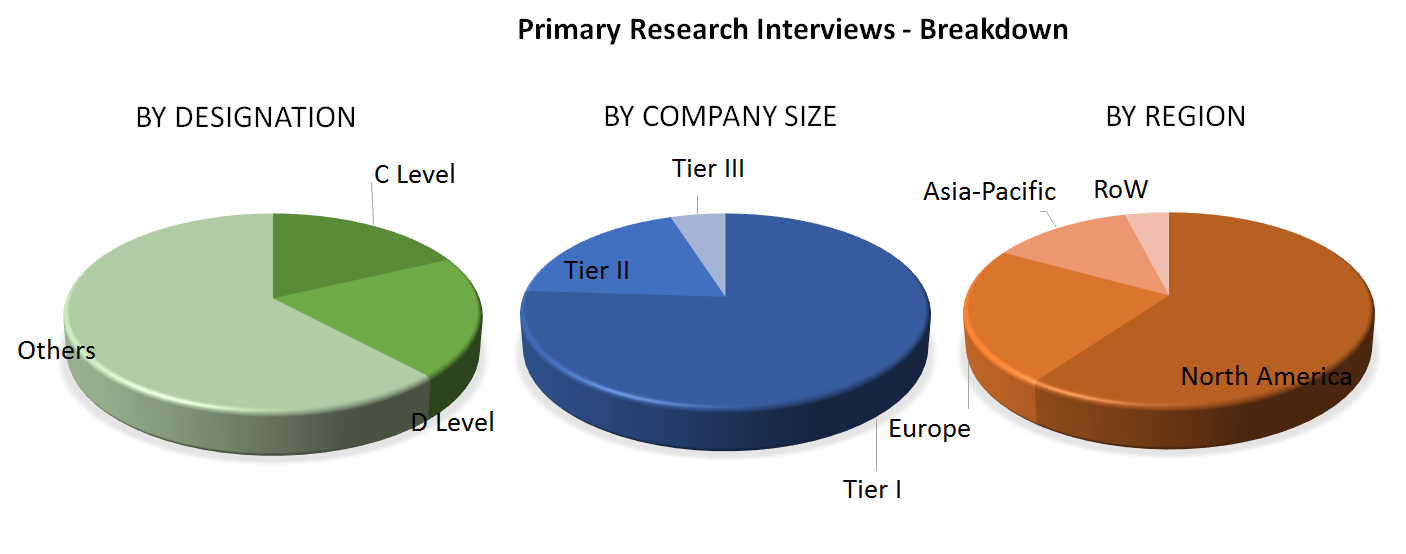Industry Overview
Population Health Management is the consolidation of patients’ health information through various technological platforms to analyze and facilitate healthcare delivery. The Global Population Health Management Market generated USD 20.12 billion in 2023 and is anticipated to reach USD 50.85 billion by 2030, registering a CAGR of 13.8% during 2025-2030. The population health management market provides healthcare facilities with software and service offerings. The software category accounts for the larger share of more than 81% in 2023. This is primarily due to the increasing customization of software as per the requirement adding an advantage to the category over other solutions. Patient engagement tools aim to actively involve individuals in managing their health. These tools provide patients with access to their health information, promote self-care, and facilitate communication between patients and healthcare providers.

The rising demand for cost-effective treatment options is one of the most significant factors that drive the growth of the global population health management market. Also, the growing adoption of disease management programs by public and private insurance providers is driving the market growth just as the rising acceptance of healthcare information technology (HCIT) which reduces healthcare expenses and provides efficacy to an overall healthcare system.
The growth is somewhat slowed down due to higher financial barriers that restrict the implementation of such initiatives and interoperability issues that limit its widespread adoption. However, opportunities are offered by the rising advancements in healthcare technology which has resulted in the increase in the adoption of these solutions and growing government initiatives to promote implementation of PHM solutions in healthcare organizations.
Population Health Management Market Segmentation
Insight by Offering
The global population health management market is divided by offering software and services. The software segment will grow more due to the high demand for customization of software and the rise in the need for healthcare integration systems and regular software upgrades and maintenance. On the other hand, the services segment will grow among hospitals and other healthcare organizations to involve third parties assessing patient data and the growing need for integrated healthcare systems.
Insight by Mode of Delivery
The global population health management market is divided by various modes of delivery into cloud-based, web-based, and on-premise segments. Among the different modes of delivery, the web-based segment will grow more due to the higher adoption of web-based delivery systems by healthcare providers and to lower the need for hardware and software systems thereby restraining the cost of installation. However, the advancement and growing trend of cloud computing will boost the growth of the cloud-based delivery mode segment due to higher flexibility and freedom to healthcare providers and improved integration of healthcare data across organizations without the need to purchase software licenses. In addition, a cloud-based mode improves processes with cutting-edge data integration technologies and advanced analytics, further benefiting end users and assisting workflow automation, care management, and coordination to provide better clinical results.
Insight by End User
The global population health management market is divided based on end-users into healthcare providers, healthcare payers, government bodies, and employer groups. Out of these segments, the healthcare providers will hold the larger share due to the benefits offered and the ability to reduce the healthcare management gap mainly faced by high-risk patient populations. It is also attributed to improved clinical outcomes, better disease management, reduced in-patient stays, minimized observation hours, efficient tracking of vital signs of discharged patients, and better analysis of provided data on patient’s health.
Insights by Component
The global population health management market is divided by components into hardware, software, service, and others. Out of these, the software segment will dominate the market in terms of revenue and grow at a higher CAGR due to rapid adoption by the payers and providers to reduce readmissions and improve operational efficiency and cost-effectiveness.
Insight by Solution
The global population health management market is divided by solutions into data integration & management, analytics, and others, where the analytics segment will dominate the market growth and will grow at a faster rate during the forecast period due to the growing need to manage the data produced by the abrupt rise in the number of chronic disease patients.
Global Population Health Management Market Report Coverage
|
Report Metric
|
Details
|
|
Historical Period
|
2018 - 2023
|
|
Base Year Considered
|
2024
|
|
Forecast Period
|
2025 - 2030
|
|
Market Size in 2024
|
U.S.D. 20.12 Billion
|
|
Revenue Forecast in 2030
|
U.S.D. 50.85 Billion
|
|
Growth Rate
|
13.8%
|
|
Segments Covered in the Report
|
By Offering, By Mode of Delivery and By End User
|
|
Report Scope
|
Market Trends, Drivers, and Restraints; Revenue Estimation and Forecast; Segmentation Analysis; Impact of COVID-19; Companies’ Strategic Developments; Market Share Analysis of Key Players; Company Profiling
|
|
Regions Covered in the Report
|
North America, Europe, Asia-Pacific, Middle East, South America and Rest of the World
|
Industry Dynamics
Industry Trends
There is an increase in the initiative by the government bodies to help healthcare providers implement PHM software to improve patient outcomes and lower healthcare expenditure. In addition, there is an increased penetration of healthcare IT solutions due to a growing preference for value-based reimbursement structures and accountable care. The awareness among people is also growing significantly for personalized medicine and there is a large variety of solutions available with varied sets of functions for different care settings. There is a growing effort to make these solutions more affordable to the general public by hospital administrators and physicians. There is a significant development in the PHM solutions making them more accurate and usable for a variety of healthcare purposes leading to larger acceptance as well. Another significant trend in the industry is the growing R&D investment by manufacturers to launch innovative products.
Population Health Management Market Challenges
Data privacy issues and concerns are significant hindrances to the growth of the global population health management market. Also, the need to collaborate between healthcare organizations, payers, and technology vendors effectively poses a significant growth challenge. Apart from that, the higher training and capital requirement for data analytics and care coordination poses limits to the implementation of these solutions and thereby hinders market growth.
Population Health Management Market Growth Drivers
The market growth is influenced by the growing demand for appropriate solutions supporting healthcare providers, a notable shift from Fee-For-Service (FFS) to Value-Based Payment (VBP) service models, rise in demand for effective disease management strategies, ability to provide data-driven healthcare and segmentation of patients based on common medical conditions and attributes, benefits offered like data aggregation, risk stratification, care coordination, and patient communication, increase in use due to complexity in care delivery, payment models, and clinical needs, and ability to combine multiple processes like clinical, financial, and operational to improve efficiency and patient care. The growing aging population is another growth factor as they are vulnerable to chronic diseases thereby needing proper health management. The rise and development of digital health systems and the growing demand for cheap treatment options to reduce the rising cost of healthcare also drive the global market for population health management. The increasing technological advancements in healthcare information technology resulting in its higher demand also propel the market growth.
Population Health Management Market Opportunities
The strategic initiatives of companies to strengthen their market presence including mergers and acquisitions create new growth opportunities. This allows for providing better and customized solutions. Furthermore, the commercialization strategies by the companies and higher investment in developing new products and platforms with enhanced and improved features are offering novel growth opportunities along with the growing preference for Value-Based Payment (VBP) models instead of Fee-For-Service (FFS) models which accelerates demand for healthcare IT solutions and disease management strategies.
Population Health Management Market Geographic Overview
North America holds the largest share and will grow during the forecast period due to growing awareness among people regarding the benefits of population health management, the growing preference to reduce healthcare expenses, and growing government initiatives towards health reform such as the Affordable Care Act (ACA).
The European will also grow at a significant rate due to higher adoption rates specifically in countries like Germany and the UK.
The higher growth rate of the Asia Pacific market during the forecast period is attributed to the developing healthcare infrastructure, rising healthcare expenses, and an increase in chronic disease incidents that need efficient management of the huge data produced.
Population Health Management Market Competitive Insight
Health Catalyst is a leading provider of data and analytics technology and services to healthcare organizations, committed to being the catalyst for massive, measurable, data-informed healthcare improvement.
Allscripts Healthcare Solutions, Inc. is a global leader in healthcare IT. The company's solutions, services, and partnerships enable organizations worldwide to build open, connect communities of health.
Key players in the global population health management market include McKesson Corporation, Cerner Corporation, Health Catalyst, LLC, Wellcentive, Inc., Conifer Health Solutions, LLC, Allscripts Healthcare Solutions, Inc., Verscend Technologies, Inc., United Health Group, and Koninklijke Philips N.V.
Recent Developments by Key Players
Royal Philips (a global leader in health technology) and Nicklaus Children’s Health System (a nationally recognized leader in pediatric care) collaborated for 10 years that shall focus at enhancing the patient and staff experience, enhancing outcomes, and driving innovation in pediatric care. Nicklaus Children’s serves over 500,000 patients a year, that shall adopt Philips technologies such as the Ingenia Ambition X MR and EPIQ CVx ultrasound, with AI-enabled radiology workflow solutions to reduce exam times and the need for rescans, while increasing diagnostic confidence, resulting in faster diagnosis and treatment for patients.
The Population Health Management Market report offers a comprehensive market segmentation analysis along with an estimation for the forecast period 2025–2030.
- By Offering
- By Mode of Delivery
- Cloud-based
- Web-based
- On-Premise
- By End User
- Healthcare Payers
- Health Providers
- Government Bodies
- Employer Group
Population Health Management Market by Region
- North America
- Europe
- Germany
- U.K.
- France
- Italy
- Spain
- Rest of Europe
- Asia-Pacific
- Japan
- China
- India
- Australia
- Rest of Asia-Pacific
- Rest of the World (RoW)
- Brazil
- Saudi Arabia
- U.A.E
- South Africa
- Others





